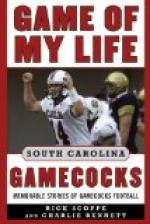My readers ask, how did the slaves at home know when their fellow negroes, the runaways, sickened or died in the woods. In general, some one on the plantation from which they ran away, or confidential friends on some other plantation, had communication with them, so that if anything happened to them the slaves at home would find out through such parties. And sometimes the masters and overseers would find out about their death, but indirectly, however, because if it was known that any one on the plantation had dealings with the runaway, he would be punished, even though the information should be gladly received by the master and overseer.
Sometimes groups of runaway slaves, of eight, ten and even twenty, belonging to different owners, got together in the woods, which made it very difficult and dangerous for slave hunters to capture those whom they were hired to hunt. In such cases sometimes these runaways killed both hunters and dogs. The thick forests in which they lived could not be searched on horseback, neither could man or dog run in them. The only chances the hunters had of catching runaway slaves were either to rout them from those thick forests or attack them when they came out in the opening to seek food.
Of course the runaways were mostly armed, and when attacked in the forests they would fight. My readers ask, how had they obtained arms and what were those arms, since slaves were not allowed to have deadly weapons? Some had large knives made by their fellow negroes who were blacksmiths, others stole guns from white men who were accustomed to lay them carelessly around when they were out hunting game. The runaways who stole the guns were kept in powder and shot by some of the other slaves at home, who bought such from poor white men who kept little country stores in the different parts of the South.
The runaway slaves generally had fathers, brothers, cousins, or confidential friends who met them at certain appointed places, and brought them such things as were needed. The most they wanted from their fellow negroes at home was salt and a little corn flour; for they lived principally on beef and swine meat, taken either from their own masters or some other’s stock.
My readers ask, did not some of the slaves at home betray their fellow negroes, the runaways, to the white man? I answer, they did; but often such were well spotted, and if the runaway slaves got a chance at them while in the woods would mob or kill them. On the other hand when they met those whom they could trust, instead of injuring them, they exchanged beef and swine meat with them for bread, corn flour, and salt, such as they needed in the woods.
THE RUNAWAY SLAVES IN THE HOUSE.
Instead of going into the woods, sometimes runaway slaves lived right around the overseer’s and master’s houses for months. A slave, named Isom, ran away from Thomas Clarkson, his master’s son, who was the overseer. Mr. Clarkson was satisfied, as he said, that the unaccustomed runaway, whom he thought was in the woods could not stay from home long, but finding that he stayed longer than expected, Mr. Clarkson hired a slave hunter with his dogs to hunt him.




